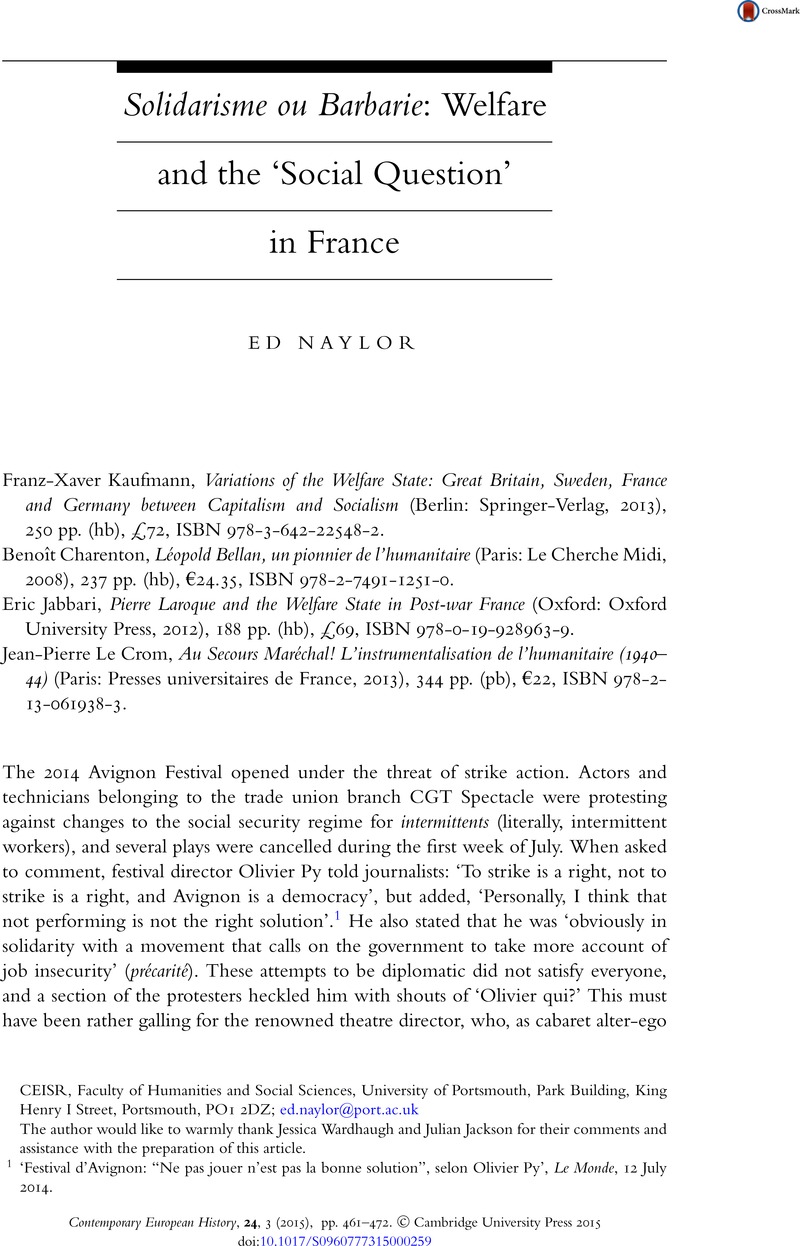No CrossRef data available.
Article contents
Solidarisme ou Barbarie: Welfare and the ‘Social Question’ in France
Published online by Cambridge University Press: 06 July 2015
Abstract

- Type
- Review Article
- Information
- Copyright
- Copyright © Cambridge University Press 2015
References
1 ‘Festival d’Avignon: “Ne pas jouer n’est pas la bonne solution”, selon Olivier Py’, Le Monde, 12 July 2014.
2 ‘Quand la bourgeoisie réclame un peu d’excès, je suis la goutte de pus qui sort de son abcès’, Olivier Py, ‘Les ballades de Miss Knife’ (Actes Sud, 2002).
3 This had originated in the 1930s as a regime for those employed on film shoots.
4 Central to the current negotiations is a proposed ‘pact for employment’ whereby social security charges for employers can be reduced in return for the latter's participation in job-creating initiatives.
5 Even at the sharp end of the labour market, acronyms have been adopted and internalised as not-always-flattering labels, such as RMIste (the RMI is an unemployment benefit tied to compulsory training) and SMICard (referring to the minimum wage rate).
6 Milner, Susan, ‘Social Policy and France's “Exceptional” Social Model’, in Chafer, Tony and Godin, Emmanuel, eds., The End of The French Exception? Decline and Revival of the ‘French Model’ (Palgrave Macmillan: Basingstoke, 2010), 56.Google Scholar
7 Looking at one concrete measure, the OECD Gini index since 1999, France and Germany are rather close, with the former rising slowly from 0.28 to reach 0.3 in 2010, and the latter hovering between 0.26 and 0.28. Sweden records the lowest inequalities (between 0.23 and 0.27), while Britain has the highest (oscillating between 0.33 and 0.35). Confusingly, Kaufmann himself refers to (older) OECD data on the Gini coefficient in his conclusion, which seems to mark Britain as the group outlier on inequalities (Kaufmann, 217).
8 Esping-Andersen, Gosta, The Three Worlds of Welfare Capitalism (Princeton: Princeton University Press, 1990).Google Scholar
9 An influential example of the latter approach is Baldwin, Peter, The Politics of Social Solidarity: Class Bases of the European Welfare State 1875–1975 (Cambridge: Cambridge University Press, 1990)CrossRefGoogle Scholar.
10 Pedersen, Sue, Family, Dependence, and the Origins of the Welfare State: Britain and France, 1914–45 (Cambridge: Cambridge University Press, 1993)Google Scholar. There is now a substantial literature examining the history of French welfare through the lens of gender. See, for example, Levine Frader, Laura, Breadwinners and Citizens: Gender in the Making of the French Social Model (London: Duke University Press, 2008)CrossRefGoogle Scholar; Adams, Christine, Poverty, Charity, and Motherhood: Maternal Societies in Nineteenth-Century France (Chicago: University of Illinois Press, 2010)Google Scholar; Kristen Stromberg Childers, Fathers, Families, and the State in France, 1914–45 (Ithaca and London: Cornell University Press, 2003).Google Scholar
11 Charenton's doctoral thesis was entitled ‘Un Philanthrope sous la troisième République: la vie et l'œuvre de Léopold Bellan (1857–1936)’, l'École nationale des chartes (2003).
12 Nord, Philip, ‘The Welfare State in France, 1870–1914’, French Historical Studies, 18, 3 (1994), 837.CrossRefGoogle Scholar
13 See, for example, Baldwin, Social Solidarity, and Dutton, Paul V., Origins of the French Welfare State: The Struggle for Social Reform in France, 1914—47 (Cambridge: Cambridge University Press, 2002).CrossRefGoogle Scholar
14 Dutton, Origins, 219.
15 For a slightly contrasting view, see Merrien, François-Xavier, Etude comparative de l'édification et de l'évolution de l'Etat protecteur en France et en Grande-Bretagne (Paris: MIRE, 1990).Google Scholar
16 Philip Nord places both figures onto a much broader interpretative canvas as carriers of a ‘not-so-Left’ modernisation project spanning the Third and Fourth Republics. See Nord, Philip, France's New Deal from the Thirties to the Postwar Era (Princeton: Princeton University Press, 2010).Google Scholar
17 On the subsequent development of France's welfare state, see Palier, Bruno, Gouverner la sécurité sociale: les réformes du système français de protection sociale depuis 1945 (Paris: Presses Universitaires de France, 2002)Google Scholar and Valat, Bruno, Histoire de la Sécurité sociale, 1945–67: L'Etat, l'institution et la santé (Paris: Economica, 2001).Google Scholar
18 Le Crom, Jean-Pierre, Syndicats, nous voilà: Vichy et le corporatisme (Paris: Editions de l'Atelier, 1995).Google Scholar
19 Jackson, Julian, France: The Dark Years, 1940–44 (Oxford: Oxford University Press, 2001).CrossRefGoogle Scholar
20 Of the major organisations Le Crom examines, all but the Croix Rouge Française had been dissolved by 1949.
21 As Le Crom observes, referring to Verdès-Leroux's, JeannineLe Travail social (Paris: Editions de Minuit, 1978)Google Scholar, this retrospective opprobrium has sometimes lacked nuance (p. 130).
22 Denis Pelletier, reviewing Bruno Valat's Histoire de la sécurité sociale in Histoire, économie et société, 22 (2003), my translation.
23 For an English translation of some of his key texts, see Rosanvallon, Pierre, Democracy Past and Future: Selected Essays (New York: Columbia University Press, 2006).Google Scholar
24 See Rosanvallon, Pierre, La Nouvelle Question sociale: repenser l'Etat-providence (Paris: Seuil, 1995).Google Scholar
25 Pierre Rosanvallon, ‘From Equality of Opportunity to the Society of Equals’, paper presented at the Maison Française d'Oxford, Apr. 2014.
26 Susan Milner highlights the gap between ‘the French ideal of solidarity and the reality of an insider-outsider labour market’, while also noting, with Kaufmann, the importance of veto-players in a sectorally divided system. Milner, ‘Social policy’, 57.




